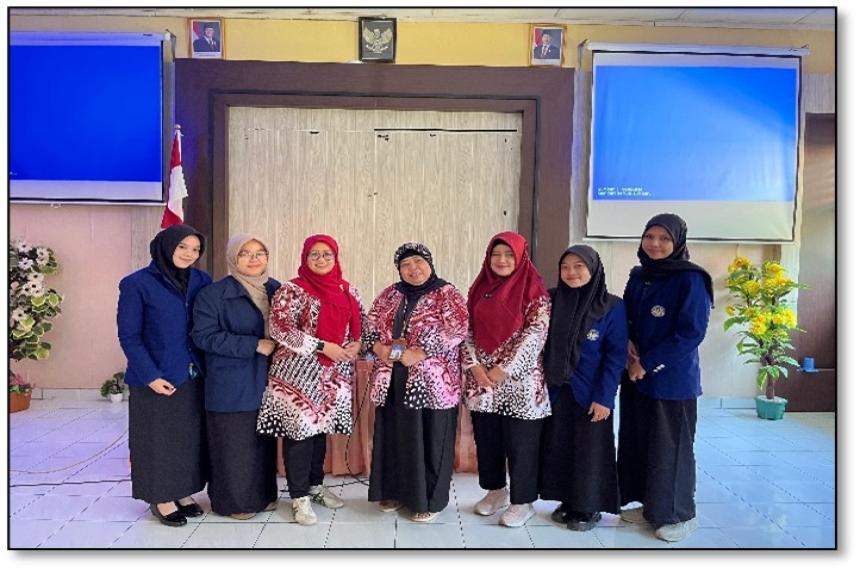 Bahasa Indonesia
Bahasa Indonesia English
English
The Mathematics Education Study Program Lecturers Team of FMIPA UNY Organizes a Bimtek for SMP Mathematics MGMP in Kulon Progo

The Lecturers Team of the Mathematics Education Study Program at Yogyakarta State University organized a workshop (BIMTEK) with the theme of mathematics learning through a deep learning approach in collaboration with the Junior High School Mathematics Teachers’ Association (MGMP Matematika SMP) of Kulon Progo Regency. The workshop was scheduled for August 7 and 21, 2025, at SMPN 1 Pengasih, Kulon Progo.
The first session, held on August 7, 2025, began with a welcoming speech by the Head of the MGMP Mathematics SMP Kulon Progo, Mr. Sudaryanta, S.Pd. He warmly welcomed this program as it provides new innovations in mathematics learning. The second speech was delivered by the Principal of SMPN 1 Pengasih, Mrs. Sri Harini, S.Pd. She also warmly welcomed the arrival of the UNY lecturers’ team who intended to share their knowledge through this workshop.
The lecturers who served as speakers in this event were Dr. Djamilah Bondan Widjajanti, M.Si., Endah Retnowati, M.Ed., Ph.D., and Husna ‘Arifah, M.Sc., assisted by four undergraduate and graduate students. The first speaker, Dr. Endah Retnowati, M.Ed., Ph.D., explained about motivation that should be applied in mathematics learning. There are two types of motivation based on self-determination theory, namely Performance-Based Motivation (where the individual’s main focus is to prove their competence to others) and Mastery-Based Motivation (where the individual’s main focus is on developing their own competence). In practice, excessive use of performance-based motivation often results in individuals giving up easily when facing failure. On the other hand, individuals who adopt mastery-based motivation tend to have strong perseverance even when encountering failure.
In the learning process, it is important to emphasize that mathematics is meaningful. Therefore, students need to know the benefits of mathematics. Mathematics has many applications in daily life, so when teaching students, teachers should emphasize rules, contexts, and ways to apply mathematics to solve everyday problems. This should be accompanied by mastery-based motivation so that students focus on improving their own competence to better understand and apply mathematics.
The next presentation was delivered by Dr. Djamilah Bondan Widjajanti, M.Si., who explained deep learning in mathematics teaching through four main topics: introduction, definition of deep learning, psychological aspects that influence mathematics learning, and strategies for teaching mathematics concepts with a deep learning approach.
In the introduction, she explained the objectives of learning mathematics. These include:
- Developing logical, analytical, systematic, critical, and creative thinking skills as well as the ability to work collaboratively;
- Fostering problem-solving skills involving mathematics in daily life;
- Applying mathematics in daily life, science, and technology;
- Building curiosity, perseverance, and self-confidence through meaningful mathematics learning.
The next explanation focused on the deep learning approach, which emphasizes creating a conscious, meaningful, and joyful learning atmosphere and process through holistic integration of intellectual, emotional, spiritual, and physical engagement. According to the speaker, some indicators that mathematics teachers have successfully implemented deep learning are: students eagerly anticipate the class (instead of avoiding it), the classroom atmosphere is lively and dynamic (students are willing to think, ask questions, answer questions, and enthusiastically learn new things), and teacher-student as well as student-student relationships are healthy and harmonious.
Teaching and learning involve many aspects. Psychological aspects play a role in the implementation of deep learning, such as growth mindset, motivation, awareness, metacognition, emotions, dispositions, self-efficacy, confidence, and others. Specifically, the speaker discussed emotions, emphasizing that positive emotions support learning objectives, while negative emotions hinder them. One type of emotion that often appears in mathematics classes is epistemic emotion, which is triggered by cognitive problems or understanding. In learning mathematics, there are two levels of understanding: instrumental and relational. Deep learning aligns with teaching approaches that enable students to achieve relational understanding.
Some key messages delivered to participants to ensure mathematics learning is meaningful for students include:
- Do not begin lessons with definitions or formulas;
- Start with contextual, realistic problems or examples of the concepts to be learned;
- Reduce the use of “how much” or “calculate” questions; focus on “why”;
- Carefully prepare the introduction (aperception, learning objectives, and motivation);
- In the main part of the lesson, pay attention to students’ thought processes, encourage them to explore various problem-solving strategies, and allow them to communicate their understanding;
- In the closing part, besides summarizing and reflecting, always connect the current topic with the upcoming one. Pose questions to spark students’ curiosity.
The agenda concluded with group assignments where participants discussed common difficulties in mathematics teaching, such as misconceptions, challenges in finding realistic contextual examples, motivating students, making concepts understandable, and engaging students actively. In addition, MGMP teachers were also assigned group tasks related to mathematics olympiad training with topics in statistics and number theory, which would be discussed in the second session on August 21, 2025, by Dr. Nikenasih Binatari and Husna ‘Arifah, M.Sc. After the task briefing, the agenda was closed with expressions of gratitude and a collective prayer.
Copyright © 2026,



